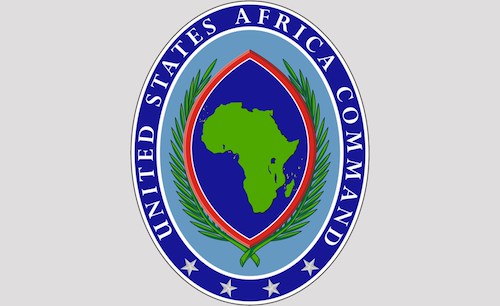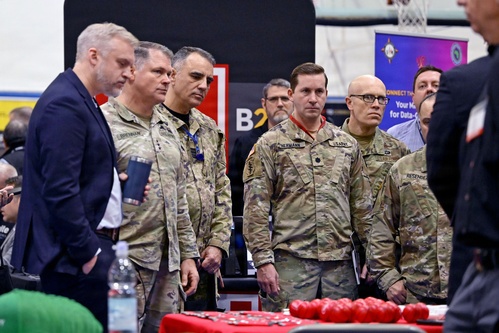Building bridges...between continents and countries...between cultures and communities...between allies...between neighbors. Exercise Flintlock 09, with closing ceremonies scheduled for November 20, 2008, brought together 14 countries desiring to achieve the common goal of increasing the capacity of African nations to better manage the safety and security of their perspective countries.
Major General Edward Leacock, deputy director of U.S. Africa Command's Intelligence and Knowledge Development Division, was one of the first speakers to address participants at the onset of the exercise. "It is my hope," Leacock said, "that Flintlock sets a strong precedent for future U.S. Africa Command engagements where the U.S. military will actively seek the partnership of African stakeholders to meet common challenges."
General Leacock added, "I have the sincere hope that a combined multinational force like the one you have established for this exercise will help our partner nations stand together to boldly confront the humanitarian crises in the Sahel and African Sahara regions."
As a joint, combined, multinational exercise, Flintlock 09 was developed by exercise planners to help improve the effective sharing of information at the operational and tactical levels between the participating nations across the Trans-Saharan region while fostering increased collaborative communication and coordination skills. Effective military-to-military training and multinational regional cooperation were the keys to success.
Navy Captain Steve Wisotzki was the commandant of the Multinational Coordination Center for the exercise.
"The multinational collaboration during this exercise has gone extremely well," he said. "I'm especially impressed with some of the frank discussions taking place amongst the African partner nation representatives gathered here. We've really tried hard to foster an environment that emphasizes our core shared values and interests, while not allowing ourselves to be distracted too much by the changing political landscapes on all sides."
Major Toure Seydou Abdel Aziz, of Niger, also commented on the exercise.
"My main role as a military officer is to keep Niger's territory safe. On a larger scale, we also must help our neighbors keep their territories safe from terrorism," Aziz said.
"Flintlock helps Niger by creating a link with our partners and helping us learn about each other. This way, by us knowing each other now, we will be able to work better together in the future."
The exercise was the culmination of an 18-month planning effort and brought together more than 200 participants including international partners, translators from across the United States, interagency partners from within the U.S. government to include USAID, and a host of other individuals and organizations who volunteered to take time away from their families and daily routines to support a shared desire to keep their lands safe and secure for generations to come.
"The lessons I learned during Flintlock are things that I will take back and pass to my generation, those junior to me as well as my superiors," Aziz said.
The overall Flintlock exercise series currently falls under U.S. Africa Command's Operation Enduring Freedom-Trans Sahara, which provides U.S. military support to the U.S. government's Trans Sahara Counterterrorism Program. It's because of programs such as this that the United States is able to work with African partner nations in improving our mutual ability to work together to protect our citizens
The Trans Sahara Counterterrorism Program, led by our U.S. Department of State, is a means to enhance regional security cooperation. It also recognizes that security depends on basic levels of economic and social development, and the United States government as a whole is committed to promoting economic development, good governance, education, liberal institutions, and democracy throughout the region. Many of these tasks are not led by the U.S. military and do not involve the U.S. Department of Defense. But, when requested and when appropriate, the U.S. military can provide support.
Over the years, program coordinators have realized that this security cooperation must also extend to basic training for a variety of military and interagency exigencies, including disaster preparedness and medical emergencies.
To work those contingencies and others, a Multinational Coordination Center (MCC) was created in Rota, Spain, to support the exercise. The purpose of the MCC was to bring key military decision makers and planners together to learn about and discuss the collaborative planning and coordination functions for multinational security, humanitarian assistance and disaster relief operations. It also provided an opportunity for participating nations to engage in cultural exchanges and work on collaboration, camaraderie and developing friendships that will last long after the exercise has ended.
"The camaraderie we've shared during the exercise, both professionally and personally has been refreshingly heartfelt," said Wisotzki, the commandant of the exercise. "There's no doubt that the seeds of change have been sown, and that the new energy that AFRICOM brings to the continent is being absorbed by all. It's been a great exercise and incredibly rewarding for me to be a part of it. I look forward to continuing the effort."
More than Counter-terrorism...Collaboration...Commitment
The Flintlock exercise consisted of small-unit combined training and activities involving U.S. special operation forces and partner nation militaries throughout the region. Among other things, the exercise included the first-ever deployment of the Air Force Special Operations Command's CV-22 Osprey to the African continent. It also included crisis response training and Medical and Veterinary Civic Action Program (MEDCAP and VETCAP) events that provided the populations in rural areas health information and medical care.
An important piece of the exercise was the establishment of the Multinational Coordination Center. The center was intentionally located away from the operational portion of the exercise and gave military planners and leaders a location to collaborate and develop concepts and plans with multinational partners.
As with the operational portion of the exercise that provided participants with hands-on tactical field training experience, the MCC provided the U.S. military the opportunity to work with Partner Nations and build bonds of trust and confidence with our friends and allies so that our common desire for peace, prosperity and security in the region is enjoyed by all.
Delegations from six African nations and five European nations made up the multinational coordination center. Together, U.S. representatives, African partners and European allies worked to build strong bridges of understanding and cooperation while continuing to demonstrate the United States' long-term commitment to the safety and security of the Trans-Saharan region.
In the MCC, exercise participants were broken into various functional groups where they collectively learned the vital responsibilities of collaborative planning and command and control functions.
Two of the team leaders responsible for guiding participants through the exercise process were Army Lieutenant Colonel Peter Tate and Major Andrew Genasci. According to the team, the MCC served as more of a collaborative planning cell than a command and control operation center.
"What we did here was to essentially design a framework for cooperation," said Tate.
The MCC concept in this environment is a new model said Tate. We are all learning together how to make it work. That's exactly what this exercise is all about," he said. "working together."
Asked about the successes and challenges of exercise, both Tate and Genasci agreed that most, if not all, of the participants had a good conceptual understanding of the operational planning and development that took place during the exercise. However, both equally acknowledged that because of the many nations, the different languages and the different cultural realities, the challenges of addressing the many different theoretical concerns proved to be a gap that was sometimes too far to bridge.
Another seemingly benign but important function in the MCC that helped bridge the gap between cultural perceptions and realities during the exercise was role of the religious lay leader.
With multiple nations from various walks of life and several faiths participating in the exercise, the planners of the Flintlock 09 exercise listened to feedback from the previous exercise two years ago and dedicated an entire room in the multi-national coordination center for those wishing to have a convenient quiet place to continue practicing their faith during the exercise.
Army Captain Michael Corley volunteered to help lead the religious services for interested individuals.
The exercise did not initially include an Imam or subject-matter expert on Islam. "They welcomed my insights into what I felt were the best ways to extend the freedom to practice religion to our partner nations," Corley said. "The leadership offered additional suggestions and then provided me with the support I needed to get things going."
Overall, Corley added, "I think providing this opportunity for all of the exercise participants was one of best things the command could have done. Feedback from those who took advantage of the prayer room was overwhelmingly positive. It went that extra effort to show that the U.S. offers more than just 'lip service' and practices what it preaches when it comes to encouraging freedom of religious expression," he said.
"Serving as a religious minority group lay-leader during Flintlock 09 was truly one of the best efforts I have ever had the pleasure of participating in during my military career," Corley said.
During the closing ceremonies for the MCC on November 19, U.S. Africa Command Director of Operations and Logistics, Major General Anthony Jackson, also commented about the cultural differences between the United States and some of the other militaries.
"You should know that even though the U.S. organized and led this exercise, our planners and participants were just as challenged as you were," Jackson said. "As many of you have expressed, and as I have heard on numerous occasions throughout my travels to Africa and other countries around the world is that we Americans are very end-result oriented and will take the fastest route possible to achieve an objective. What this means is that we sometimes do not take the time to take into consideration the cultural sensitivities that could often hinder us from achieving that objective. I hope that during the course of this exercise, our team leaders spent as much time listening as they did leading."
Though the overall focus of the exercise was aimed at counter-terrorism efforts, participants also understood that the multinational exercise encompassed much more.
In a video message to exercise participants, General William "Kip" Ward, commander of U.S. Africa Command, said, "Flintlock brought the expertise and experience from each nation together so that the entire team could benefit. By working along side each other, you helped improve the security capacity and capability of all the participating nations."
U.S. Africa Command considers the ability to work together, with Africans leading the way, as essential to ensuring the common goal of a stable and secure Africa. This includes everything from stemming the flow of illicit arms, goods and people, to preventing outlaws from seeking or establishing sanctuaries in the Trans-Saharan region, to multinational efforts to prevent or respond to potential natural disasters that threaten entire populations.
The United States is proud to have been a partner in Flintlock and looks forward to future opportunities to improve bilateral capabilities and interoperability between U.S. and partner nation forces.




